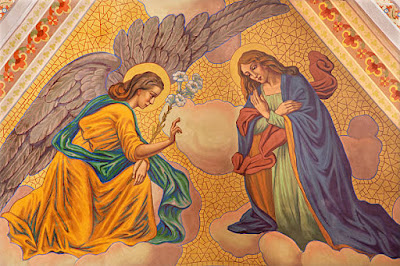GOD'S LOVE FOR MEN.
March 25, 2022
Solemnity of the Annunciation of the Lord.
Readings: Is 7:10-14; 8:10; Ps 40:7-8a, 8b-9, 10, 11; Heb10:4-10; Lk 1:26-38.
“Behold, you will conceive in your womb and bear a son, and
you shall name him Jesus.” (Lk 1:31)
An Albanian proverb says: “A proof of faith is obedience.”
And a Spanish proverb adds: “God is a good worker but He loves to be helped.”
We are today nine months from Christmas, and we celebrate
something special and unique, the mystery of God's love, the mystery of the
Incarnation. This feast fills our hearts with joy and gratitude, as we
contemplate how much God loves us. We rejoice also to see, how through Mary,
the lowly woman, God makes of our humanity, an instrument of human salvation.
He associates man to man’s salvation. The Apostle John says in the prologue of
his Gospel: “God so loved the world that he sent his only Begotten Son...” (Jn
3,16)
In mythology, the Greeks believed that their gods -
especially Zeus- mate with mortals to produce offspring who are part-god and
part-human. They are called 'demigods'. These demigods had the 'divine' side
that enabled them to achieve greater feats than mere mortals. E.g: Heracles aka
Hercules (born to Zeus and Alcmena) and Perseus (born to Zeus and Danae).
Our Christian belief and definition of the Incarnation go
beyond a divinity having offspring with human beings. We have to understand the
great difference between the Christian doctrine of the incarnation and the
Greco-Roman tendency to describe their gods as having human qualities. That is,
the Greek gods are just more powerful humans—they have bodies and do human
things, but at a different level. The Christian claim, the mystery of the
Incarnation, on the other hand, is that the ineffable and unapproachable God of
the universe willingly condescended and took on human nature. The second person
of the Trinity humbly assumed human flesh to reveal the Father, to speak of
God’s love.
We read from the I-Breviary: "The mystery that the Holy
Church celebrates today is the announcement of the Archangel Gabriel to Mary,
that she had been chosen by the Lord among all women to be the Mother of God,
and the incarnation of the Word in her most pure womb. In ancient times,
today's feast was also designated with the name of "Conception of
Christ", "Annunciation of the Lord". This shows that it was
celebrated more as a feast of the Lord than of the Madonna; only with the
passing of time did it gradually take on a marked Marian character. Today it is
considered almost exclusively as a feast of the SS. Virgin." Nevertheless,
it loses nothing of its meaning that, God from today becomes one of us and one
with us, and that in nine months his glory will be fully revealed to us under a
little child, the Emmanuel.
The readings tell us of this mystery, how it finds itself in
God's plan of salvation. To King Ahaz, the Lord spoke and announced the
virginal conception and the name to be given to the child, “Emmanuel”. Behold,
the virgin shall conceive. This child comes with a royal and prophetic mission,
to be the presence of God amidst his suffering people and assure them not only
of God's proximity but also of their salvation. Emmanuel because God is with
his people to lead them to salvation.
For us Christians, this prophecy finds its perfect
fulfillment in the childbearing of the woman of Nazareth. The Gospel passage of
the Annunciation narrates how this took place. God sent his Angel Gabriel to
bring to the wife-to-be of Joseph the great news of the Incarnation. “Do not be
afraid, Mary, for you have found favor with God. Behold, you will conceive in
your womb and bear a son, and you shall name him Jesus. He will be great and
will be called Son of the Most High, and the Lord God will give him the throne
of David his father, and he will rule over the house of Jacob forever, and of
his kingdom, there will be no end.” To this surprising news, the answer of Mary
was simple and deep, a self-surrender out of obedience to God's plan and love:
“Behold, I am the handmaid of the Lord. May it be done to me according to your
word.” Even though she could not understand it fully, even though she had her
personal plans of life and projects of the future, Mary adhered to God's
project and gave him the lead of her life. She became a model of obedience:
"Fiat, voluntas Tua..."
The second reading stretches on this topic of obedience.
Christ himself came into our human likeness out of obedience to His Father.
“Behold, I come to do your will.” He took up humanity in order to do God's will
and not his own. He became man to save mankind from sin out of obedience to
God's will. The will of God here is his love, the reason why he created us.
We are created out of love. We are regenerated by love. And more wonderfully, we are saved out of love. Thus, the incarnation of Christ is a mystery of love. And Mary is made part of the completion of this mystery. Out of love, God wants to save us. But he cannot do it without our cooperation with his project. Like Mary and Jesus, may we open ourselves in obedience to the project of God on our lives. Genuine love is made manifest in obedience. Day after day, let us give our unconditional ‘Yes’ pronounced with faith to God. With the Psalmist, may we sing: “Here I am, Lord; I come to do your will.” (Ps 40:8a)





Comments
Post a Comment